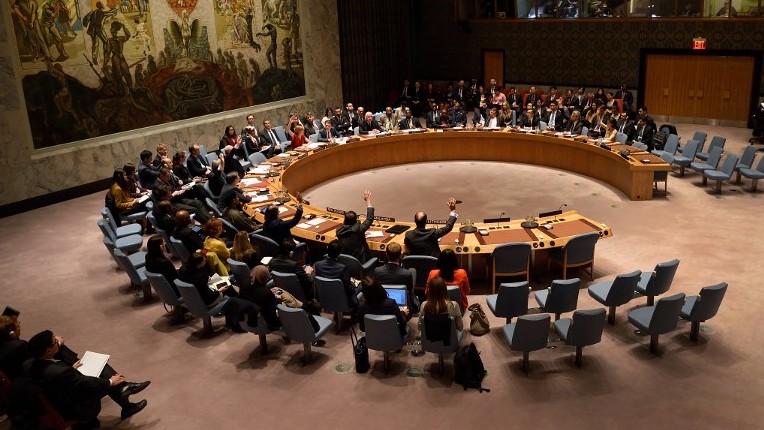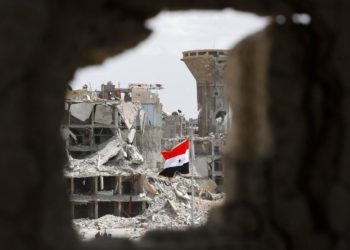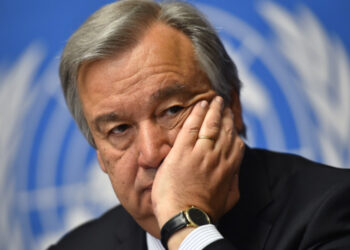The pandemic has produced some strange diplomatic results. The EU has applied travel sanctions on the citizens of the United States. Cuba and China have been active with medical diplomacy in Italy. The World Health Organization has proved a convenient scapegoat for many sovereign states. Australia’s exports have been cut simply because it criticized China.
Much has been written about “The New World Disorder,” how tackling the issue of climate security will be even harder, or, as Council on Foreign Relations President Richard Haas argues, whether the pandemic will just accelerate the pace of history.
UN Secretary-General Antonio Guterres saw the failure of diplomacy in bleak terms. “The world was not able to come together to face COVID-19 in an articulated coordinated way,” he concluded in May. “Each country went with its own policy in different countries with different perspectives, different strategies, and this has allowed the virus to spread.”
#COVID19 is a crisis unlike any in the 75-year history of the @UN.
World leaders must come together and offer an urgent & coordinated global response.
More than ever before, we need solidarity, hope and the political will to see this through together.https://t.co/4qGoAhTYpe pic.twitter.com/yogPhUio7l
— António Guterres (@antonioguterres) March 19, 2020
Despite facing the most global of threats, little that diplomacy tried collectively worked. Major institutional mechanisms such as the UN, G20, and EU have been mostly invisible.
Yes, blame the states. But also blame all of us who care about diplomacy. Nationalism and multilateralism are never good fits. However, this goes beyond the era of Donald Trump’s America First and its distaste for dialogue.
The question, amid a global crisis, is why collective diplomacy is now shunned. The principal team game that is supposed to bolster global security and prosperity is hardly being played.
Resetting of Diplomatic Options
Major crises in the past produced a resetting of diplomatic options. The obvious example is 1945. After World War II, at negotiations of the United Nations in San Francisco, representatives of some 1,200 volunteer organizations were present. They pushed for the first seven words of the Charter, “We the peoples of the United Nations…” In those days, diplomacy was everyone’s business.
However, there were problems with diplomatic institutions and options well before the pandemic.
International diplomatic institutions develop rivalries and obstacles to consensus-building through their own operations, and institutions are costly to run. Those who pay most usually get the spoils.

On top of that, many institutions reflect the priorities of the eras in which they were created. Still, diplomacy is increasingly bypassing institutional structures, and increasing personalization of relations between state leaders is a poor basis for consensus-building.
Additionally, digital media has stimulated uni-directional attention-grabbing by states, an easy escape-valve from institutional gridlock.
Lastly, there has been no systematic integration of global non-state actors into diplomatic platforms.
New Options
Leaving the well-documented obstacles to UN reform aside, the major difficulty with new options is developing them. Governments see little political gain in promoting diplomacy as an issue.
So, what are the options? Diplomacy will still need its institutions, summits, permanent missions, and specialist agencies. Bureaucratic inertia tolerates diplomatic institutions long after their utility has faded.
My suggestion is to leave what we have alone and think afresh. The digital era, apart from the raucous chaos of social media finger-pointing — sometimes linked with the more constructive activity of public diplomacy — has hardly been exploited by the practitioners of diplomacy who aim to build consensus and avoid conflict.
Tele-medicine and tele-education have already shown that confidential and mutually beneficial conversations can take place on digital platforms, away from the glare of trolls and memes. Why not collectively use tele-diplomacy?
Mutual Benefit from Diplomacy
While many international stakeholders in diplomacy have multiple identities — practitioners, scholars, activists, businesses, owners of tech platforms — they all share an interest in giving diplomacy more options for collective action.
Pandemics, climate security, cyber warfare, terrorism, weapons proliferation, and migration and displacement are issues where states recognize interdependence. There is mutual benefit from diplomacy. How it is conducted affects global and individual interests.
Let’s all take the blame. Diplomacy in 2020 cannot be a spectator sport. No citizen in any country would accept being denied an interest in how pandemics are handled. Diplomacy should be no different.
New Tele-Diplomacy Forum
To be effective, a new tele-diplomacy forum needs to be continuous, not related to a particular crisis, and must involve all the G20 countries at a minimum. It should be discreet, a forum to brainstorm, and a shared commitment to making diplomacy work better.
There would be opportunities to involve non-state actors on an ad hoc basis. Philanthropists Jack Ma and Melinda Gates are already helping the UN analyze digital interdependence. It would be an option for diplomacy to build consensus. No funding would be needed or communiqués issued — just an acknowledgment that diplomatic interaction in the 2020s requires a new mindset.
We truly live in the age of digital interdependence!
A year ago, #DigitalCooperation high-level panel launched their report @melindagates @antonioguterres @nikolaiastrup.
Still rings true: Our path forward must be built through cooperation and illuminated by shared human values https://t.co/VNftCIRfRk
— NorwayUN (@NorwayUN) June 10, 2020
Such a forum would need structure. Each representative in participating G20 countries might be allocated a leadership role on specific issues to edge toward some consensus through collective consideration. And the forum would be ready for rapid response to the next global crisis. There may be a risk of leaks, but past practices of collective discussions suggest that these are rare.
What’s in it for the powers who prefer unilateral solutions to major problems? Well, intelligence services always value knowledge about the thinking of others. And peer pressure matters in this digital age. If this option proves ineffective, we should be capable of thinking of something else that goes beyond more hand-wringing.
There is a precedent, and we did well in the past. The UN and its agencies were designed to promote peace and economic stability for the world of 1945. It was risky and untried then. Now is the time to float a movement for better diplomacy in a digitalized and multi-polar world.
Diplomacy should not be using a toolkit from the last century. It needs to be restructured to collaborate constructively and continuously through not just the next pandemic but in any crisis that cannot be solved by individual states.
Disclaimer: The views and opinions expressed here are those of the author and do not necessarily reflect the editorial position of The Globe Post.






















